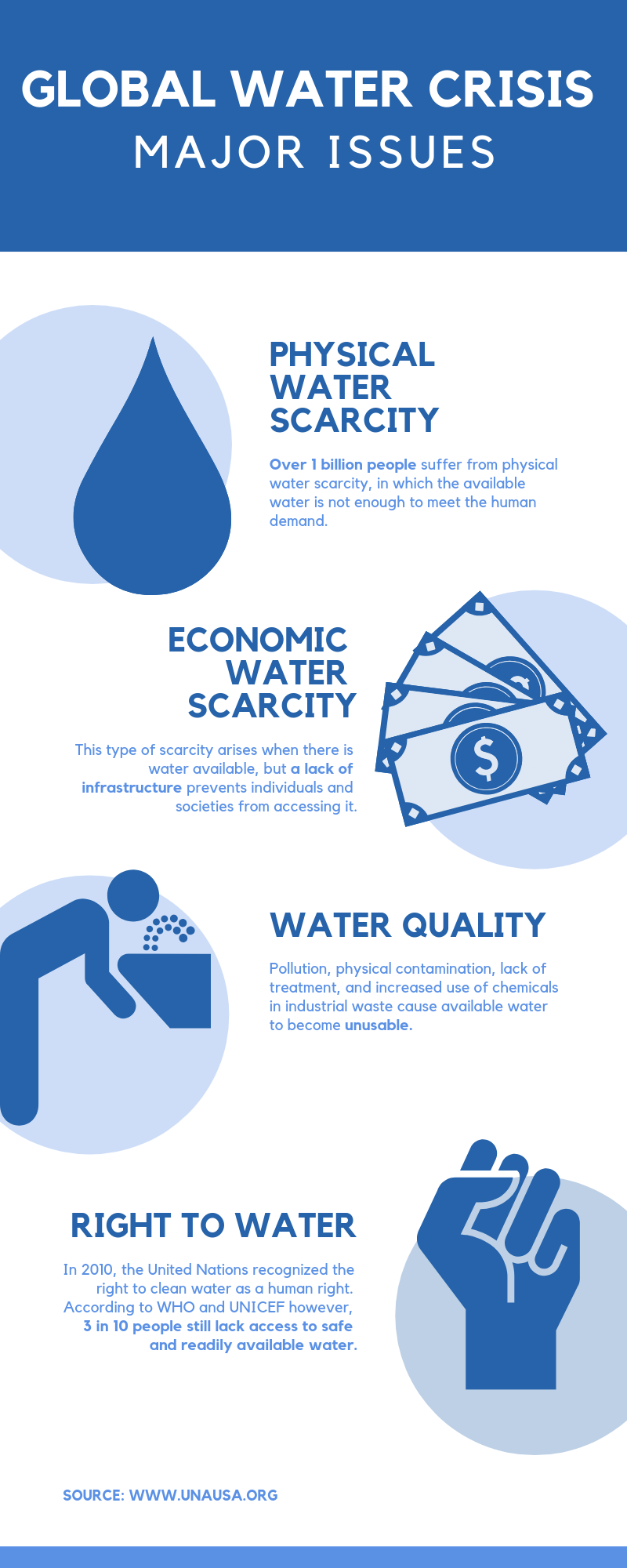Women and Water Insecurity
Did you know: UNA-USA students interested in the water crisis can host a case competition on their campus. See this post for more details. Campus Fellow Gillian Daley writes about how the water crisis intersects with Sustainable Development Goal 5: Gender Equality.
Water is everywhere.
Water flows through the oceans that nourish our planet. It’s in the atmosphere, continually cycling in and out of it’s gaseous and liquid states. It’s even inside of us, constituting nearly 60% of the mass within a human body. We live in a water-full world, and it’s the lifeblood that allows ever species on the planet to survive.
With this in mind it’s easy to understand how the access to clean and freely available drinking water is a necessity to life. Water security is a human right that must be defended. Unfortunately, not everyone has equal access to water.
In some parts of the world, clean water is a rare commodity. It’s hard to come by and even harder to gather and transport. In some regions of the world, the act of getting enough water for a family to sustain itself might take hours of hard physical labour. Though the lack water security is a global issue that affects everyone in the international community and nearly 2.2 billion people world-wide are directly affected by water insecurity, this is a issue that specifically carries a heavy toll on women and girls in the developing world.
In many regions, they are quite literally carrying the responsibility of their community’s water on their backs. Women and girls throughout Southeast Asia, Latin America and Africa are often saddled with the task of gathering days worth of water for their families from local water sources that may be miles away from their homes. While this is necessary for families and communities that would otherwise be facing indefinite water insecurity, it’s also a major detriment. Women and girls who are tasked with overseeing the “water work” of their communities are subsequently made vulnerable. Being forced to travel for long distances from their homes to their local water source is not only physically taxing but it’s also dangerous. Aside from the plethora of physical strains that come along with this burden (such as back pain, shoulder pain, bruising, and serious sprains, etc.), these routine trips to local water sources place the young women at risk as they must often travel for miles – alone – through rural countrysides.
In addition to the physical burden, there is the issue of the time that is lost to water work. Young women and girls who are tasked with collecting water for their families and communities dedicate hours from their day to provide water for bathing, cooking and drinking. This time, compounded with the time that some young women in the Developing world are often expected to spend on other domestic duties, is precious time taken from their schooling. When women and girls in these communities are spending on average around 5 hours collecting water, their ability to maintain a presence in school and get a completed education is severely impacted. The issue of water insecurity isn’t just about the lack of accessibility to water throughout the world, it is multifaceted and far-reaching in what it affects. It has gender equity and socio-economic implications that mean that it has a hand in shaping the development of communities and nations as a whole, not to mention it is an issue of human rights. And, therefore, is something that demands our immediate action.
Here are some organizations you can donate to or volunteer with to address the global water crisis:
- Water for Good – An organization focused on organizing water-centric development for regions within Africa to assist in cleaner, more stable and more accessible water. https://waterforgood.org/donate/
- The Water Project – Non Profit organization creating community driven projects for water accessibility in Sub Saharan Africa. https://thewaterproject.org/give-water
- Generocity.org – This is an organization focused on multiple nations throughout the Developing world by organizing water development projects. https://generosity.org/the-impact/
You can also participate in the 2019 UNA-USA Case Competition regarding the water crisis! Host a case competition on your campus to explore these issues in depth.




